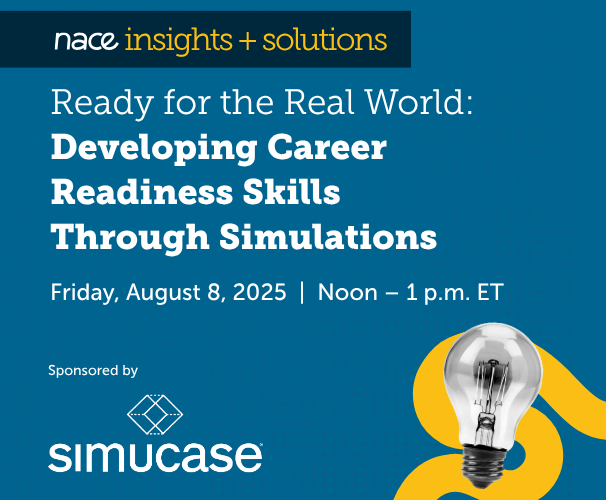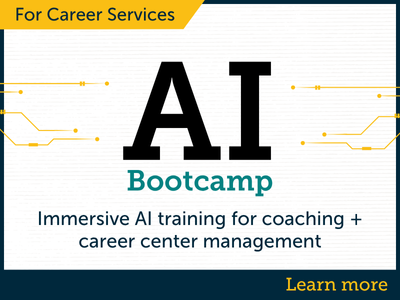Future Business Leaders of America (FBLA)—the world’s largest business career and technical student organization—has integrated the NACE Career Readiness Competencies into its collegiate programming to bridge a critical gap between classroom learning and the demands of the modern workforce.
“We understand that employers are consistently highlighting the need for graduates who can think critically, communicate effectively, and lead in dynamic environments. By aligning our programming with these core competencies, we’re equipping students to excel in both their first jobs and long-term careers,” says Alyssa Ring, FBLA’s collegiate program manager.
Ring explains that this approach addresses a major challenge, which is to ensure students “enter the workforce and thrive in it. Our members will be more confident in their ability to navigate complex problems, collaborate with diverse teams, and adapt to changing industries. We are ensuring they stand out not just for what they know, but for how they apply that knowledge in real-world scenarios.”
Gayle Robinson, FBLA’s director of education programs, says that while post-secondary institutions do a great job equipping students with the technical knowledge needed for their chosen fields, the organization has seen a growing gap when it comes to the essential “soft” skills that employers increasingly value.
“These skills, like communication, critical thinking, and problem-solving, are at the core of the eight NACE Career Readiness Competencies,” Robinson says.
“At FBLA, we’re focused on providing our members with practical opportunities to develop these skills in real-world contexts so they can confidently step into their careers with a well-rounded set of abilities. We want our members to not only master their chosen fields but also excel in the critical human skills that set them apart as leaders.”
The Goal Is Preparation
Through this work, FBLA’s goal is to ensure its collegiate members graduate as the most prepared versions of themselves, equipped not just with knowledge, but with the practical skills that set them apart in today’s competitive job market.
“We’re focused on providing real-world experiences that challenge students to lead, problem-solve, and communicate effectively, so they can enter the workforce confident, capable, and ready to make an impact from day one,” Robinson notes.
Two of the vehicles for the organization’s career readiness development and practice are the FBLA Collegiate Programming Guide and its Professional Foundations Program:
- The FBLA Collegiate Programming Guide (Volumes 1 and 2) is designed to help the organization’s chapters create engaging, skills-focused experiences for their members. Featuring real-world activities and practical exercises, the guide supports the development of the eight NACE Career Readiness Competencies. By integrating this guide into chapter programming, student leaders can foster a supportive environment where members gain practical experience, learn from one another, and prepare to stand out in their careers.
- Piloted during the 2025 National Leadership Conference to give students a comprehensive, hands-on approach to career readiness, the Professional Foundations Program guided participants through all eight NACE Career Readiness Competencies using a blend of workshops, competitive events, and direct engagement with industry leaders. Students completed a pre-conference self-assessment to set a baseline, engaged in hands-on experiences during the conference, and reflected on their growth through a post-conference career action plan. Those who completed the program earn the FBLA Professional Foundations digital credential, recognizing their commitment to building critical skills through real-world practice.
Ring explains that the Collegiate Programming Guide puts the responsibility for skill development directly in the hands of students.
“By its very nature, the guide encourages students to sharpen their communication, collaboration, and critical thinking skills through practical exercises, self-assessments, and peer feedback,” she says.
“With each activity, students take on the challenge of articulating their ideas, working in teams, and tackling real-world problems, building the very skills that set them apart in the eyes of employers.”
Meanwhile, the Professional Foundations digital badge was created to recognize this commitment to growth.
“This badge is a clear signifier to employers that the earner is committed to developing essential skills and dedicated to ongoing professional growth. It signals to employers that FBLA members are not just technically prepared, but also actively developing the critical, transferable skills needed to thrive in today’s workforce,” Ring points out.
“It’s a tangible way for students to showcase their readiness and stand out as career-ready professionals.”
FBLA’s programming includes competitions through which students can refine their ability to convey their strengths in high-pressure, real-world scenarios.
“Beyond competitions, we’ve created opportunities for students to practice their elevator pitches, polish their resumes, and build a professional online presence, all while gaining valuable feedback from real industry professionals,” Robinson says.
“As those of us in the workforce already know, it’s not just about having the right skills, it’s about effectively communicating your value to stand out in a competitive job market.”
Program Assessment and Lessons Learned
FBLA will measure the effectiveness of its Collegiate Programming Guide and badging program through several key methods. First, it will look at engagement and completion data, specifically how many students are actively using the guide and completing the FBLA Professional Foundations program.
“We’ve also built in surveys for both programs to collect feedback from students and advisers, which helps us establish continuous feedback loops. That input is essential for refining and improving the experience over time,” Ring says.
Employer engagement is more complex as, Robinson notes, FBLA doesn’t yet have a direct line to measure how employers are interacting with or responding to student participation. However, it is something the team is interested in developing, particularly through future partnerships that could help it assess the real-world application and value of these programs.
Through work on this initiative, Ring and Robinson have realized that building a skill isn’t enough; students also need to know how to talk about it.
“It’s one thing to develop leadership or critical thinking [skills]; it’s another to be able to confidently explain how those experiences translate into something valuable for an employer. That kind of communication takes just as much practice as the skill itself,” Robinson says.
They have also seen how much stronger programming becomes when industry is part of the equation.
“Students want to know that what they’re doing connects to the real world, and having professionals involved brings a level of relevance and authenticity we can’t replicate on our own,” Robinson says,
“There’s still a lot of room to grow in that space, and it’s something we’re actively working to expand.”
Expansion aligns with the forecast for this work, as everything FBLA is building is designed with long-term impact in mind.
“We’re not just trying to create impressive programming on paper; we’re trying to give students something that sticks with them long after graduation. Whether it’s through hands-on experience, industry connections, or just learning how to communicate their value, our goal is to make sure FBLA isn’t just a line on their resume, but it’s a launchpad,” Ring stresses.
“And honestly, we’re just getting started. There’s so much potential to grow this space, especially as we bring in more voices from students, advisers, and employers. That collaboration is what’s going to take our programming to the next level.”







